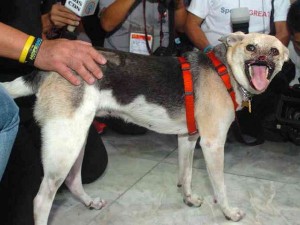‘Victory for the underdog’

CELEBRITY PET Kabang strikes a pose as she faces the press upon her arrival at Ninoy Aquino International Airport Terminal 2, accompanied by veterinarian Anton Lim. RODEL ROTONI
MANILA, Philippines—It would have been the usual press conference, with photographers and TV cameramen jostling each other, trying to get a better view of their subject.
Except that instead of a glamorous model, the object of such fondness was a mongrel dog with a sweet, disfigured face.
Such is the charisma of Kabang, the hero dog from Zamboanga who lost her snout in 2011 when she ran in front of a motorcycle, apparently to prevent her two young masters from being hit.
“It’s the first time I’ve seen the media become instant fans of their subject,” amused veterinarian Anton Lim of Team Kabang said in a press conference Saturday in Makati City to welcome the dog home to the Philippines.
Because it would entail a “brittle procedure” that could cause complications, Kabang was not yet outfitted a prosthetic snout, leaving her tongue exposed.
But Lim and fellow Team Kabang veterinarian Edgardo Unson said Kabang could breathe, smell, eat and drink normally.
“She can chew because she still has the molars in the back and her tongue will not dry because her salivary glands are still functioning,” said Unson.
Unson added that the surgery was intended “to prevent infections and complications,” as well as to ensure that Kabang retained all physical functionality.
Lim said that after the surgery, the dog exhibited a more carefree disposition and was no longer scared to play or to be touched.
When Kabang faced the press on Saturday, it was apparent that the gaggle of photographers spooked her. But the dog remained quiet and headed straight toward Lim.
Therapy dog
Lim described Kabang as especially sweet (malambing). “She gives good hugs. When she cuddles, all her attention is on you. Journalists in the States said she’s a good candidate for a therapy dog,” he said.
“These 18 months [since the accident], Kabang did not show any pain. She is an amazing dog,” Unson said.
The fund-raising organization Care for Kabang, launched by New York-based nurse Karen Kenngott, received donations from 45 countries and counting.
“Donations ranged from 44 cents to $1,000. Most of the donations were only a dollar or two. You would learn over Facebook some students would skip their lunch to donate. A cancer patient donated. We had a lot of overseas Filipino workers donating, too,” Lim said.
“This is a victory for the underdog,” Lim said, noting that these ordinary citizens stepped in when big animal welfare organizations refused to help Team Kabang.
“Here and in the United States and in other countries, we approached the well-known animal welfare groups, and all of them suggested euthanizing [Kabang]. They said it was too big a cost to spend on one dog,” Lim recalled.
But in her eight months in the US, Kabang would be recognized as more than just “one dog.”
In 2012, she received the Red Cross Animal Hero of the Year medal. She also received certificates of special US congressional and senatorial recognition, among other accolades.
Lim said Team Kabang and the Animal Welfare Coalition were thinking of expanding their advocacy.
“This is only the beginning. People gravitate to Kabang. She has this power, this magnet to draw people close to her. Her influence is wide. These are stories we never expected over an ‘asong-Pinoy,’ a mongrel owned by a poor family,” he said.
He said from Kabang’s story, young kids can be taught responsible pet ownership. “She saved the lives of her young masters, the message being: If you do good to someone, good will also come to you. Love begets love,” Lim said.


















